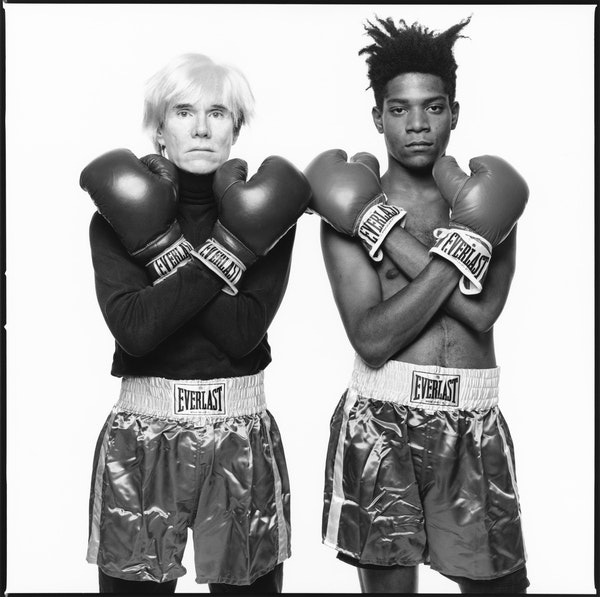Basquiat × Warhol. Painting four hands

In 2018, the Fondation featured the “Jean-Michel Basquiat” exhibition. It continues its exploration of the work of the artist, revealing, this time, his collaboration with Andy Warhol.
Exhibition trailer
Between 1984 and 1985, Jean-Michel Basquiat (1960-1988) and Andy Warhol (1928-1987) created around 160 paintings together in tandem, “à quatre mains”, including some of the largest works produced during their respective careers. Keith Haring (1958-1990), who witnessed their friendship and collaboration production, would go on to speak of a “conversation occurring through painting, instead of words,” and of two minds merging to create a “third distinctive and unique mind.”
“Basquiat × Warhol. Painting four hands” is the most important exhibition ever dedicated to this extraordinary body of work and brings together more than three hundred works and documents including eighty canvases jointly signed by the two artists. Also featured are individual works by each as well as a set of works by other major artists (Futura 2000, Michael Halsband, Keith Haring, Jenny Holzer, Kenny Scharf...…) in order to evoke the energy of the New York downtown art scene of the 1980s.
The four-handed work of Kenny Scharf and Futura 2000
The exhibition will open with a series of portraits of Basquiat by Warhol and of Warhol by Basquiat. It will continue with the early collaborations. These works, initiated by the two artists’ dealer, Bruno Bischofberger, benefited from a collaboration with the Italian artist, Francesco Clemente (born in 1952). After completing these 15 paintings together with Clemente, Basquiat and Warhol pursued their collaboration on an almost daily basis, with enthusiasm and complicity. The energy and force of their incessant exchanges will be the driving force of the exhibition, running through all of the galleries in the Foundation featuring highlights such as the monumental sculpture Ten Punching Bags (Last Supper) or the 8 meter canva African Mask.
Basquiat admired Warhol as an elder, a key art world personality, and the pioneer of a new language and of a groundbreaking relationship to pop culture. Warhol, in turn, found in Basquiat a renewed interest in painting. Thanks to him, he went back to painting manually on a very large scale. Warhol’s subjects (newspapers, logos of General Electric, Paramount and the Olympic Games) serve as the basis for whole series of artworks that will punctuate the exhibition.

Michael Halsband, Andy Warhol & Jean-Michel Basquiat #143 New York City, July 10, 1985, 1985
Courtesy of the artist © Michael Halsband

Jean-Michel Basquiat et Andy Warhol, Untitled (collaboration no.23) / Quality, 1984-1985
© Estate of Jean-Michel Basquiat Licensed by Artestar, New York © The Andy Warhol Foundation for the Visual Arts, Inc. / ADAGP, Paris 2023
« Andy would start one (painting) and put something very recognizable on it, or a product logo, and I would sort of deface it. Then I would try to get him to work some more on it, I would try to get him to do at least two thing »

Jean-Michel Basquiat et Andy Warhol, Collaboration No. 19, 1984-85
© Estate of Jean-Michel Basquiat Licensed by Artestar, New York, © 2023 The Andy Warhol Foundation for the Visual Arts, Inc. / Licensed by ADAGP, Paris Crédit photographique : Courtesy of Zidoun-Bossuyt Gallery, Luxembourg

Jean-Michel Basquiat et Andy Warhol, 6,99, 1984
© Estate of Jean-Michel Basquiat Licensed by Artestar, New York, © 2023 The Andy Warhol Foundation for the Visual Arts, Inc. / Licensed by ADAGP, Paris Crédit photographique : Courtesy Nicola Erni Collection, © Reto Pedrini Photography
The exhibition will show these back and forths - a dialogue of styles and forms that also tackles crucial subjects such as the integration of the African-American community into the narrative of North-America - a continent in which Warhol was a leading manufacturer of icons.
« ”I drew it first and then I painted it like Jean-Michel. I think those paintings we’re doing together are better when you can’t tell who did which parts »

Andy Warhol, Portrait of Jean-Michel Basquiat as David, 1984
© 2023 The Andy Warhol Foundation for the Visual Arts, Inc. / Licensed by ADAGP, Paris 2023 Crédit photographique : Courtesy Norman et Irma Braman




